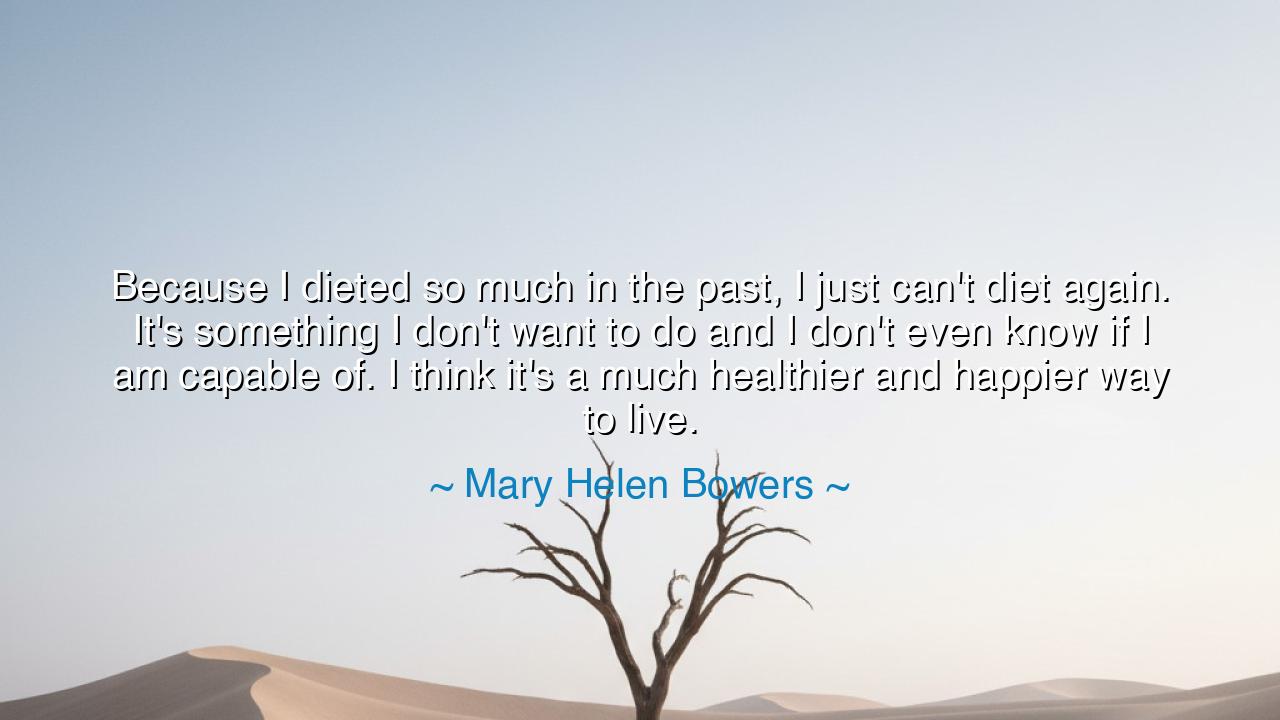
Because I dieted so much in the past, I just can't diet again.
Because I dieted so much in the past, I just can't diet again. It's something I don't want to do and I don't even know if I am capable of. I think it's a much healthier and happier way to live.






In the reflective and liberating words of Mary Helen Bowers, we find the quiet wisdom of a soul who has wrestled with her own discipline and found peace: “Because I dieted so much in the past, I just can't diet again. It's something I don't want to do and I don't even know if I am capable of. I think it's a much healthier and happier way to live.” These words, though simple, carry the depth of one who has lived under the weight of expectation, who has known both the rigidity of control and the freedom of acceptance. They speak not only of food, but of balance, forgiveness, and the healing that comes when one lays down the burden of perfection.
Mary Helen Bowers, once a prima ballerina and later a renowned fitness teacher, lived in a world that demanded constant precision — a world where the line of the body was a symbol of both beauty and worth. The discipline of ballet, though sacred in its devotion, often asks its followers to deny their own bodies in the pursuit of form. And so, her words carry the echo of this struggle: the long war between body and will, between nourishment and denial. When she says she “cannot diet again,” she is not speaking from weakness, but from awakening. She has looked upon the cost of obsession and chosen instead the path of wholeness — a path that honors the body not as an enemy to conquer, but as a friend to sustain.
The ancients, too, spoke of such balance. Aristotle, in his Nicomachean Ethics, taught that virtue lies in the golden mean — the sacred middle between excess and deficiency. To eat too much is folly, but to eat too little is another kind of folly. Both are forms of imbalance that lead the soul astray. The wise, he said, find contentment not in denial, but in harmony. And so, Bowers’ rejection of dieting is not rebellion against discipline, but a return to nature’s truth — that life is best lived in balance, not in constant restriction. She does not praise indulgence, but freedom — the freedom that comes when food is no longer a symbol of guilt, but of gratitude.
There is a story from ancient Rome that mirrors this wisdom. The emperor Augustus, when young, lived with such restraint that his health began to fail. His physicians advised him to eat with moderation, not austerity, warning that self-denial carried its own poison. In later years, he learned to live in equilibrium, to feast not in excess, but with joy. His reign — calm, ordered, and fruitful — became a reflection of his inner balance. Likewise, Bowers, after years of strict control, found that the body thrives not under tyranny, but under trust. When the mind releases its grip, the body remembers how to live.
When she calls her new way of living “healthier and happier,” she is speaking of more than the physical. She is describing a shift of spirit — from fear to acceptance, from punishment to peace. For to diet excessively is often not an act of care, but of fear — the fear of imperfection, of judgment, of losing control. Yet perfection is an illusion that devours the soul. True health is not found in the shrinking of the body, but in the expansion of the heart. Happiness, too, is not born from control, but from compassion — compassion toward oneself, and the body that carries one through every trial and triumph of life.
There is also humility in her confession: “I don’t even know if I am capable of it.” These words are not defeat; they are surrender — the kind of surrender that frees rather than binds. It is the wisdom of one who has learned that some battles are not meant to be fought, for the victory comes in laying down the sword. The body, when trusted, knows its rhythm. It asks not for punishment, but for care; not for starvation, but for sustenance. The soul, too, flourishes when freed from constant striving. To live this way — gently, without fear — is to rediscover what it means to be fully human.
So let this be the teaching: Do not wage war against yourself. Eat with awareness, not anxiety. Move your body with joy, not judgment. Let your health be guided by harmony, not by hunger for perfection. In a world that glorifies control, be the one who honors balance. In a culture that measures worth by size, be the one who measures it by serenity. For the one who learns to nourish rather than restrict, to live rather than to prove, walks in the light of true freedom.
And in the end, Mary Helen Bowers’ words remind us that health is not a battlefield, but a garden. The soil of that garden must not be stripped by excess discipline, nor choked by indulgence, but tended with care, patience, and respect. To live happily and healthily, as she teaches, is to understand that peace with the body is peace with the self — and that no mirror, scale, or garment can measure the quiet power of one who has finally made peace with her own reflection.






AAdministratorAdministrator
Welcome, honored guests. Please leave a comment, we will respond soon